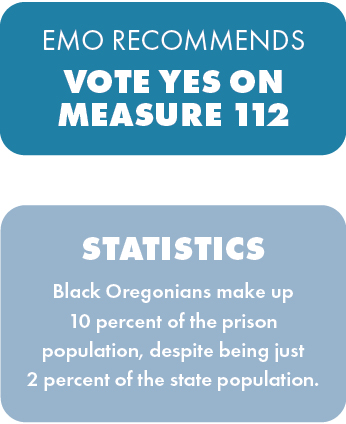Summary
Measure 112 changes language in the Oregon Constitution to remove any loopholes allowing for the use of slavery or involuntary servitude. Section 34 of Oregon’s Constitution currently permits the use of slavery or involuntary servitude “as a punishment for crime, whereof the party shall have been duly convicted.” This measure would change the language in Section 34 to simply read: “There shall be neither slavery nor involuntary servitude in this state.”
Additionally, a new article would be added to Section 34. This article puts in writing the ability of courts, probation agencies, and parole agencies to order education, counseling, community service, and other alternatives to incarceration for people convicted of a crime.
The measure started out as SJR 10, and it passed the Oregon Legislature with bipartisan support with the vote count being 76 to 11.
Supporters
Supporters of Measure 112 argue it is a crucial step towards racial justice and equity in Oregon. Oregonians of color are disproportionately represented in Oregon’s prison population; Black Oregonians make up 10 percent of the prison population, despite being just 2 percent of the state population. In the past, imprisonment of Black Americans has been used to limit freedom and ensure that Black Americans could be taken advantage of as a cheap source of labor.
Supporters also note that Measure 112 will remove language that serves as a reminder of Oregon’s racist legacy.
Opponents
There is no formal campaign opposing Measure 112. The Oregon Department of Corrections remains neutral on this measure, but raised concerns about the potential conflict with Measure 17—a previously approved ballot initiative in 1994 (now codified in Article I, Section 41 of the Oregon Constitution)—which obligates AICs (adults in custody) to participate in meaningful work training programs. They express concern that future lawsuits might require AICs to earn a wage for participation in this program.
EMO Recommendation: Vote “YES” on Measure 112
As currently written, the constitution’s use of language regarding slavery and involuntary servitude is incompatible with the fight for racial justice and fair treatment of Oregonians in custody. Using slavery, a word and practice that has painful historical and present-day implications, is unjust and steeped in racism.
Ecumenical Ministries of Oregon also supports the right to honorable employment. We strongly believe in a system that affirms the rights of workers, and adults in custody are no exception. While Measure 17 may provide important job training for AICs, forcing them to work for no pay is not only unfair but echoes back to historical practices of slavery, particularly given the over-representation of Black Oregonians in the prison population.
Furthermore, it is unlikely this change will have the wide-ranging effects raised by opponents of this measure.
EMO Social Principles
This recommendation is based on the EMO social principles of Human Rights and Religious Freedom and Economic Justice. See EMO's Statement of Social Principles for more details.






